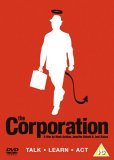Blood Diamond (2006)
Είδα πριν από λιγο το Blood Diamond. Πολύ ευχάριστη έκπληξη, ιδιαίτερα αν λάβει κανείς υπ’όψην του πόσο σπάνια μια αμερικάνικη ταινία αυτού του budget και με τέτοιο cast καταφέρνει να προσεγγίσει ένα τόσο σημαντικό θέμα — ή μάλλον μια σειρά από ζητήματα που αφορούν την Αφρική. Ένα Constant Gardener meets Hotel Rwanda με μια δόση […]

 Errr, right. Despite his --- numerous --- amazingly bad evaluations (e.g. the importance of the 'net in the mid-1990s), his volatile opinions on important matters (e.g. patents), lack of ethics and piss-poor software, Bill Gates has time and again proven to be an important thinker when it comes to technology and its importance in society. It's a shame to see he's lost it. In this latest interview in Newsweek it's actually surprising to see how he can be so off-base. While there's no doubt that Apple is king in catchy marketing and shameless exaggeration of its value and its products' {importance, features} in its marketing campaigns, Microsoft is no spring chicken either ('Get the Facts' campaign anyone?). Its funny how Gates tries to engage in the pompous reality skewing and typical polemic that his once-ideologically-charged-turned-loser-turned-mighty-tech-salesman rival, the mercurial Steve Jobs, is famous for. Unfortunately for him Gates lacks the 'Charisma +834' rating that Jobs seems to possess. :)
Errr, right. Despite his --- numerous --- amazingly bad evaluations (e.g. the importance of the 'net in the mid-1990s), his volatile opinions on important matters (e.g. patents), lack of ethics and piss-poor software, Bill Gates has time and again proven to be an important thinker when it comes to technology and its importance in society. It's a shame to see he's lost it. In this latest interview in Newsweek it's actually surprising to see how he can be so off-base. While there's no doubt that Apple is king in catchy marketing and shameless exaggeration of its value and its products' {importance, features} in its marketing campaigns, Microsoft is no spring chicken either ('Get the Facts' campaign anyone?). Its funny how Gates tries to engage in the pompous reality skewing and typical polemic that his once-ideologically-charged-turned-loser-turned-mighty-tech-salesman rival, the mercurial Steve Jobs, is famous for. Unfortunately for him Gates lacks the 'Charisma +834' rating that Jobs seems to possess. :) 